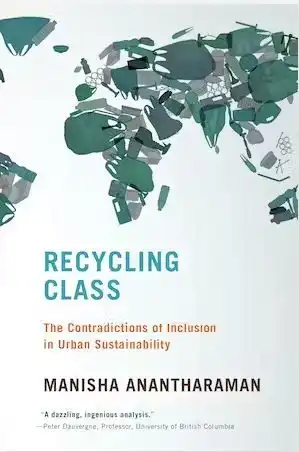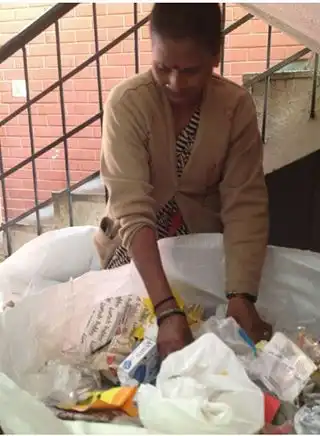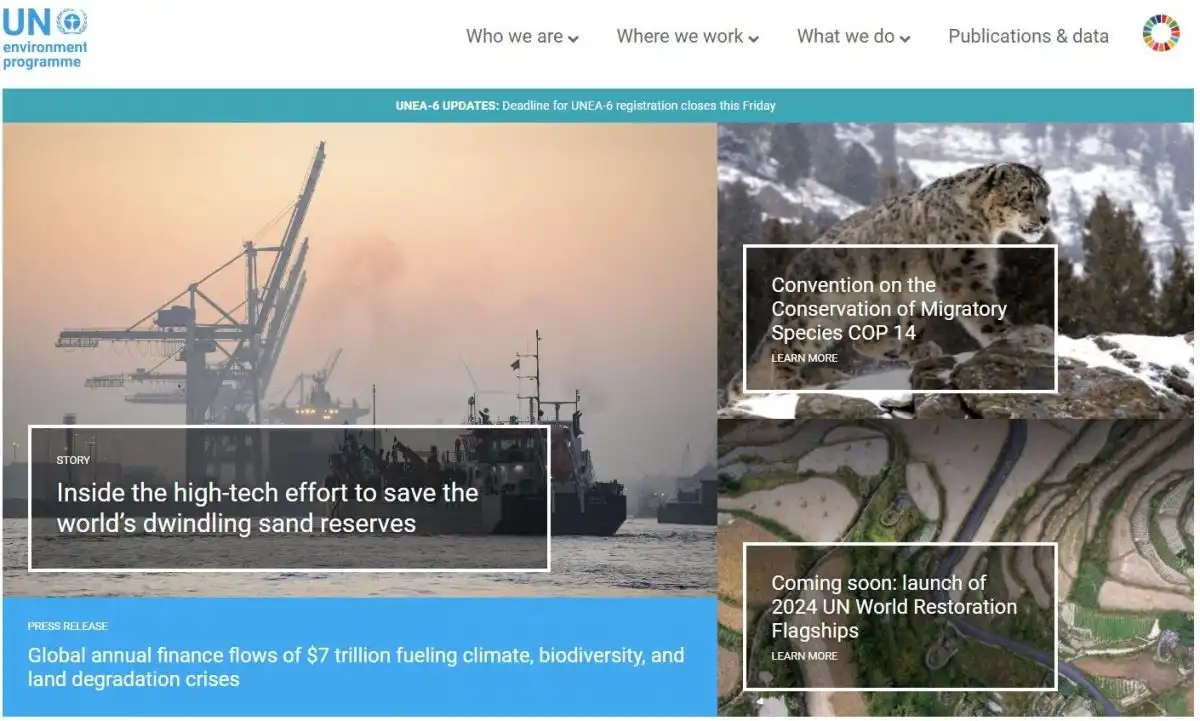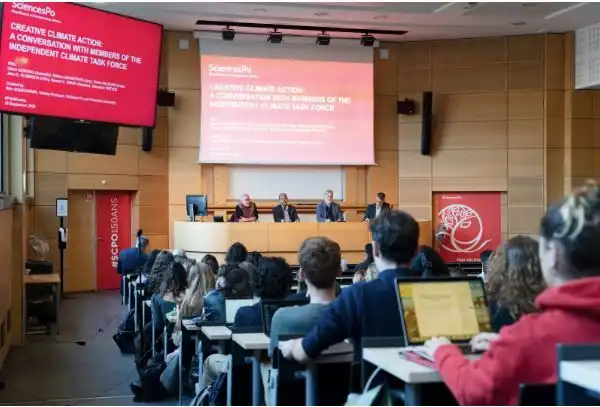Accueil>Interview with Manisha Anantharaman, a new Assistant Professor in Sociology of the Environment and Ecological Transition
09.02.2024
Interview with Manisha Anantharaman, a new Assistant Professor in Sociology of the Environment and Ecological Transition
Manisha Anantharaman has been recruited to the position of Assistant Professor in Sociology of the Environment and Ecological Transition at Sciences Po and joined the CSO teams in January 2024. Her research focuses on how economic and political ideologies, socio-cultural identities and inequalities affect the realization and implementation of ecological transitions.
“I combine theoretical frameworks from cultural sociology, feminist political economy, and urban political ecology to link middle-class, sustainable consumption with the environmental labor of the working poor and offer a situated, relational, and intersectional analysis of urban sustainability politics and practice. “
You are interested in everyday sustainability practices and political mobilizations. After 10 years of observations in the field, you have published a book entitled "Recycling Class", just out from MIT Press. What are the results of your work?

Grounded in ethnographic fieldwork in Bengaluru, India, the book analyzes urban waste livelihoods, infrastructures, and social movements in relation to the flows and discourses of global “clean and green” neoliberal sustainability and circular economy agendas. I combine theoretical frameworks from cultural sociology, feminist political economy, and urban political ecology to link middle-class, sustainable consumption with the environmental labor of the working poor and offer a situated, relational, and intersectional analysis of urban sustainability politics and practice.
Empirically, I traced garbage politics in the city for over a decade and looked at how middle-class actors, the state, waste pickers (who make a living reclaiming value from waste), and business actors navigated each other. I found that middle-class “communal sustainability” efforts which emphasize decentralization and low-tech solutions, create new avenues for waste picker organizations to make claims for infrastructural inclusion.

Coproduced “DIY infrastructures” serve as sites of citizenship and political negotiation, challenging the technocratic and growth-based logics of dominant sustainability policies. Yet, these configurations reproduce class, caste, and gender-based divisions of labor, demonstrating that inclusion without social reform can reproduce unjust distributions of risk and responsibility.
Ultimately, the work is a critique of the “inclusion agenda”. Inclusion in of itself is not a panacea for injustice and “win-win” fallacies undermine the transformative potential of ecological transitions.
Since 2021 you have been an Associate Fellow at Chatham House, and you are currently collaborating with UNEP, the United Nations Environment Program, leading global authority on the environment. A report will be submitted shortly. What is your involvement in this program?
The public policy debate on the ecological transition needs the theories and tools of sociology. My Associate Fellowship at Chatham House’s Environment and Society Center gives me a platform to communicate research for the public and policymakers. Right now, I am working on a policy report for UNEP linking consumption and circularity for which we are synthesizing a large body of academic literature, reviewing policy implementation in cities across the world, and developing a methodology to create context-specific policy packages to reshape food, mobility and housing consumption. We facilitated workshops with stakeholders representing various sectors, geographical regions, and expertise areas to ensure that the findings encapsulate a global perspective. The report also emphasizes the perspectives of marginalized groups in planning the ecological transition and offers some tangible actions to accomplish this.

I want to emphasize that doing this type of policy work is not straightforward, by many means. As a critical scholar who studies power relations, I am attuned to the difficulties of pursuing transformative solutions for sustainability within the incumbent order. At the same time, I recognize the importance of elevating critical research and Global South perspectives in milieus where these are underrepresented. This is why, and despite frequent misgivings and a constant awareness of the contradictions of trying to do critical and action-oriented work simultaneously, I have accepted opportunities to address a broader policy audience through my work. Conversely, these experiences inform my scholarship and teaching, enabling me to make theory-to-praxis links in my research publications and in the classroom.
What motivated you to join Sciences Po and the CSO?
Many reasons! First, discussions and debates about the ecological transition are really front and center here in France. There are many opportunities to do interesting research, particularly around themes of inequality, inclusion and the “just transition”. Sciences Po as an institution is also clearly committed to research and teaching on the ecological transition, as evidenced by the numerous programs and initiatives dedicated to this. I am excited to join these efforts and contribute to these conversations with my global and intersectional perspectives.

Regarding the CSO, I feel an affinity with the researchers here and think that my work is at the intersection of the themes that the laboratory is focused on: how (formal and informal) work/workers are engaged in the ecological transition, the interplay between social movements, markets, and public policy, amongst others. I look forward to discussions and building collaborations with CSO colleagues.
I was also attracted by the opportunity to work at an institution with a global profile and a global commitment. Sciences Po hosts students from all over the world. I think these global perspectives enhance our understanding of contemporary social issues, and particularly ecological issues which have an inescapable global dimension. The opportunity to teach at top-notch Masters programs at Sciences Po was also an added bonus.
On a personal note: I do not know how to drive! I somehow survived the United States for 13 years as a non-driver, but it is really nice to be in a city and country with excellent public transportation.
What courses do you teach and what messages do you want to get across to students?
At Sciences Po, I will teach courses on Environmental Justice, and Environmental Sociology. I love teaching. The classroom is my home on any campus.
My teaching philosophy is inspired by humanists like Paulo Freire, bell hooks, Ella Baker and others. I am to create a humanizing and energizing classroom where students integrate conceptual frameworks, historicized understandings, and careful observation to think critically about their social and environmental contexts. My goal is to equip students to evaluate and respond to socio-ecological questions through critical thinking, shared inquiry, and engaged citizenship.
I am also particularly happy to work with Masters and PhD students who are interested in participatory and community-based research approaches, a type of pedagogy and research method in which I have a lot of experience.
What are your upcoming projects?
I have two projects that are launching right now:
The first of these looks at the relationship between digitalization and ecological transitions. Along with researchers from Sweden, Norway, Turkey, and Japan, I am co-Principal Investigator of a successful funding bid to the Belmont Forum’s Collaborative Research Activity on Systems of Sustainable Consumption and Production, funded by the US National Science Foundation. Our team was awarded 1.3 million Euros over three years to study the digitalization of household consumption and its environmental outcomes in five countries. In this mixed-methods project, we combine theories of practice with ethnographic methods to understand everyday life and apply lifecycle analyses to quantify the impacts of digital interventions for sustainability in the domains of food and mobility. It will culminate with a series of design workshops with municipal governments, digital app designers, and civil society groups.
Second, I am embarking on a multi-year study on informal work in the circular economy from a comparative perspective. This project will systematically explore how multinational corporations, intergovernmental organizations, and the EU frame and engage informal waste economies in their circular economy transition plans. In turn, it will explore how waste pickers and informal recyclers in Asian and African cities are co-opting, resisting, and modifying schemes to incorporate them into global recycled-value chains. Of particular interest will be the role of intermediary market and civil society actors such as global development organizations, venture capitalists, and nonprofits in mediating these evolving economic and social relations.
